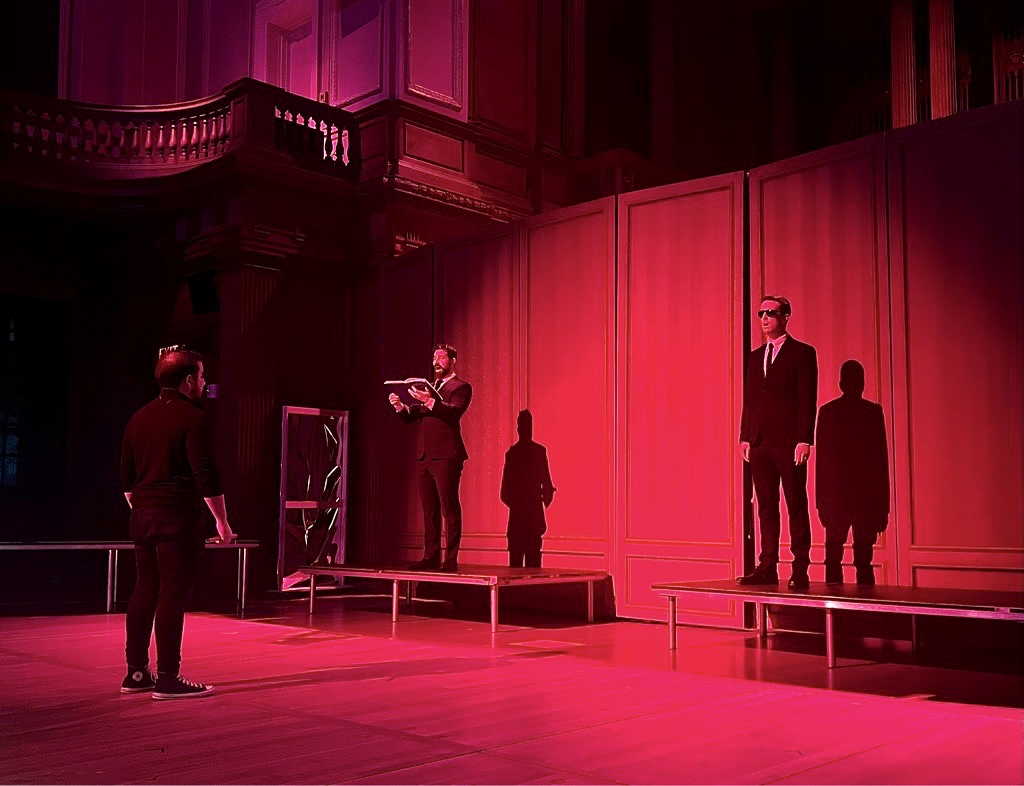The Opera Workshop performs a modernized The Magic Flute
January 25, 2023

This year, the College’s Opera Workshop brings a modernized production of Mozart’s Die Zauberflöte, The Magic Flute in English, to the stage. The Singspiel — a musical-theater-like combination of spoken scenes and arias — tells the story of foreign Prince Tamino overcoming trials to rescue and win the hand of Princess Pamina.
Directors Paul La Rosa ’02 and Erin K. Casey selected the famous opera to showcase the College’s current talent. “From the point of view of a singer and educator of singers, my primary concern [in choosing an opera] is the voices that we have in the school at this time,” La Rosa said. “We focus on which voices would do a good job in this show and what show will give as many people as much opportunity as possible.”
Many roles in the production have been double-cast or allow students to sing in trios to create more leading role opportunities for students. Performers said that sharing roles has presented both an acting challenge and a valuable lesson in ensemble performance. “Being a character in a trio, we have to learn when to be one thing together on stage — being the same person — and finding moments to be individuals,” Cooper Johnson ’26, who is playing one of the Three Spirits, said.
Johnson added that the workshop has helped him hone his acting skills. “I learned how opera acting is different from musical theater acting,” he said. “The emotions you express are a lot less organic — less natural — than in musical theater because opera houses are huge. Performers project that emotion to every single person in the house.”
Besides the opportunity to strengthen their acting abilities, performers expressed excitement about exploring the opera’s central themes. “There’s a dichotomy between characters who enjoy the more simple pleasures of life such as food, wine, and just having a good time, and noble, more serious, more earnest characters who are in search of something higher like love, power, or knowledge,” Emily Ham ’23 said. She is playing the first of the Queen’s Three Ladies. “Despite the fact that our music might sound and represent something different, Mozart still finds a way to put all this together and make it sound so beautiful.”

Molly Arts ’24, who is playing the Queen of the Night, was eager to highlight the opera’s representation of women. She noted that many of the female roles, especially the queen, are intended to be villainous, but portraying the role has allowed her to see the queen from a new perspective.
“Women in power are often portrayed in the media and the arts as villains,” she said. “A man in power is respectable, but a woman always turns into the villain. Stepping into [the Queen’s] shoes has made me feel empowered by her … The Queen of the Night is usually viewed as this mother who’s homicidal, but becoming her helps you realize that she’s just an overprotective mother who thinks she’s doing what is right.”
Arts described how working to modernize Die Zauberflöte enabled her to reenvision the female characters beyond the show’s historically misogynistic depictions. “[The Queen’s daughter] Pamina is often portrayed as the scared little girl who doesn’t know what to do, but she has more power than people give her credit for,” Arts said. “She’s able to get past her mother’s wrath and find love. She also sees the best in people, and I think that’s often seen as emotional vulnerability. It’s really more of a strength. I think there are ways of interpreting [Die Zauberflöte] that don’t demonize or demean women.”
To modernize the production, the Opera Workshop eliminated racist and sexist aspects of the opera such as the Queen’s banishment to the underworld. “I’ve never really liked [the Queen’s banishment] as an interpretation for the show, even if that was the original intention,” La Rosa said. “From the reading that I have done where the central theme is the unification of opposites, I don’t really see the Queen going to the underworld at the end. I see the sun rising in the morning and the earth turning. The Queen had the last 12 hours and Sarastro will have the next 12 hours, but the Queen will be back.”
La Rosa and Casey also utilized costume design to integrate aspects of today’s world into the fantastical story. For example, the Three Ladies’ costumes represent social media. The Three Spirits wear the logos of dating apps like Tinder to literalize how they aid Tamino on his romantic quest.
La Rosa expressed hope that the opera would provide an emotional experience for audiences. “I think the arts, in general, are really good at opening people up to their own emotional realities,” he said. “If I can make you walk out of the theater and be a more complete human being because you can pay attention to a certain emotional reality that we maybe tend to ignore, then I’m happy.”
Yona Kruger ’25, who is performing as the second of the Three Ladies, said that she wants audiences to recognize the talent of the College’s musical community and the professional resources at its disposal. “I don’t think people realize that Williams has access to the music world in a real way,” she said. “The music department here is very serious. We’re singing at a conservatory level at a liberal arts college.”
Johnson said that the performance presents a unique opportunity for students who do not sing to interact with the operatic world. “There’s a kind of mysticism about opera, and the general public doesn’t see it as an accessible art form,” he said. “I think it’s going to be cool to see that your everyday peers can do this.”
The cast of Die Zauberflöte gave its first performance on Jan. 23 and will perform for a final time on Jan. 25 in Chapin Hall.








